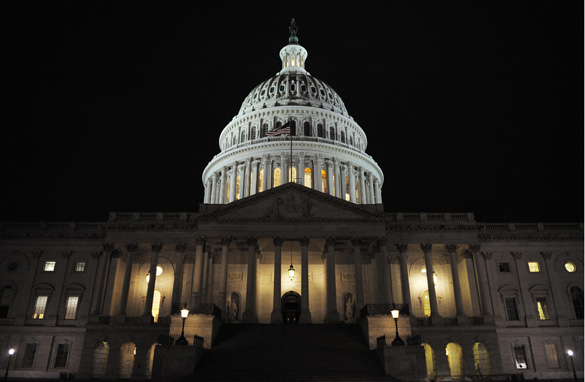As of this morning, reports have been filtering in from Ukraine that Russian forces have begun slowly entering Ukraine. And unlike what unfolded on the Crimean Peninsula, these aren't just Russian troops with no insignias. Vox reports that some of the assets Russia has moved into the region include "Russian artillery, Russian tanks, Russian-trained irregular forces, and even uniformed Russian soldiers".
At around the same time this was reported, Fox was able to report that pro-separatist forces had opened a new front in the conflict by attacking the strategically important city of Novoazovsk, a resort town of approximately 12,000 which borders Crimea. Leaving aside questions of how a group who just a few weeks ago was on the brink of defeat in Donetsk now have the logistics and manpower to attack elsewhere, what makes this move suspect is that Novoazovsk, should it be taken would leave a clear path to Mariupol, a city through which runs a road that serves as the only land connection Crimea has (via Ukraine) with the rest of Russia. Photographs of the besieged town showed plumes of smoke rising from the eastern Ukrainian city (pictured), due to what residents described as a heavy artillery barrage. Interestingly enough, a quick Youtube search reveals that back in March when Russia began the process of annexing Crimea, it brought along with it heavy artillery not unlike those which the pro separatist "rebels" are currently pounding Novoazovsk with.
Taken in tandem with a videos that surfaced which purported to show the ten Russian paratroopers Ukraine had claimed to have captured admitting to being Russian military personnel under orders to invade Ukraine, it should leave no doubt in the minds of NATO that there is much more to Russia's role in this conflict than the bystander it claims to be. And thankfully, that seems to be the case. The Canadian government has taken quite a hawkish position on seeming Russian interference in the affairs of Ukraine, culminating in sending military aid earlier this month. It made its position on this latest incursion known immediately, issuing a tersely worded tweet earlier today:
At around the same time this was reported, Fox was able to report that pro-separatist forces had opened a new front in the conflict by attacking the strategically important city of Novoazovsk, a resort town of approximately 12,000 which borders Crimea. Leaving aside questions of how a group who just a few weeks ago was on the brink of defeat in Donetsk now have the logistics and manpower to attack elsewhere, what makes this move suspect is that Novoazovsk, should it be taken would leave a clear path to Mariupol, a city through which runs a road that serves as the only land connection Crimea has (via Ukraine) with the rest of Russia. Photographs of the besieged town showed plumes of smoke rising from the eastern Ukrainian city (pictured), due to what residents described as a heavy artillery barrage. Interestingly enough, a quick Youtube search reveals that back in March when Russia began the process of annexing Crimea, it brought along with it heavy artillery not unlike those which the pro separatist "rebels" are currently pounding Novoazovsk with.
 |
| Shelling in Novoazovsk (Associated Press) |
Geography can be tough. Here’s a guide for Russian soldiers who keep getting lost & ‘accidentally’ entering #Ukraine pic.twitter.com/RF3H4IXGSp
— Canada at NATO (@CanadaNATO) August 27, 2014
Meanwhile the United States, which has has been letting Germany take the lead on Ukraine as of late, has not been totally neglecting the crisis unfolding there. As the New York Times reported:
"Analysis by Western officials indicates that Russia is orchestrating a multipronged offensive against Ukrainian forces. Russian forces have been trying to help separatists in eastern Ukraine break the siege of Luhansk, one of the main rebel-held cities, and open a corridor to another, Donetsk, from the Russian border"
The United States role can be best described as the good cop to Canada's bad cop, with its more nuanced criticism of Russia and focus on gathering intelligence to discredit Russian claims of non-interference in the country. In fact, earlier today the US finally broke their relative silence on Ukraine, in a statement accusing Russia of reinforcing faltering rebel efforts. "These incursions indicate a Russian-directed counteroffensive is likely underway in Donetsk and Luhansk," State Department spokesperson Jen Psaki told reporters. And so given the recent escalation in the conflict, expect an announcement soon from the President on potential military aid in the form of advisors and equipment for the Ukrainian military, as well as a possible beefing up of NATO presence within the borders of regional members. But make no mistake, Russia and Ukraine have all but formally gone to war, with Russia seeking to strengthen its grip on the vital defence industries present in Eastern Ukraine, as well as carve out a land strip connecting it to the currently largely isolated Crimea. Should they succeed, it would destabilize an already precarious situation in Ukraine, and would prevent a democratic government from exerting control over all of its territories.
But interestingly enough, Russia's continued "whodunit" approach to engaging with its neighbours may be having negative ramifications for its foreign policy ambitions. Putin's Eurasian Economic Union pet project is starting to look like an abject failure. Despite all the transformations this conflict has undergone, its important to remember it was first ignited by then-President Yanukovych moving towards joining Putin's attempt at a counterbalance to the EU. Since then, Azerbaijan, Uzbekistan and Turkmenistan have all been reluctant to draw themselves into Russia's sphere of influence again after seeing it's messy divorce with once-close ally Ukraine, and even those who have agreed to ascend are causing Russia significant headaches. Kazakh fears over potential Russian aggression have lead to the severing of several mutual defence treaties, and it forging its own foreign policy route. It blocked Armenia, a major recipient of Russian aid, from ascending, and along with Belarus refused to join Russia in banning food imports from the West. It'll be interesting to see if in the long term the antagonism Russia is breeding ends up manifesting into something more than just a healthy skepticism of Russian intentions, but right now it is imperative that Western countries come to the aid of Ukraine before Russia is able to tear it in two.



